Have you ever seen a politician give a speech that really gets the crowd? They use their charm and words to win people over. But there’s more to it than meets the eye. Political salesman comics blend politics with satire, offering a sharp look at campaigns.
In the 1950s, America’s politics got more complicated. A new group of cartoonists stepped up to comment on it all. Jules Feiffer, for example, made a splash in 1958 with his cartoons in the Village Voice. His work tackled big topics like money gaps, racism, and education.
Key Takeaways
- Political salesman comics use satire to expose the tactics and rhetoric of political campaigns.
- Influential satirists like Jules Feiffer, Al Capp, and Walt Kelly used their art to comment on societal issues and the political landscape.
- Satire in political comics provides a unique lens for understanding the complexities of the American political system.
- The use of satire in political commentary has evolved over time, reflecting the changing dynamics of public discourse.
- The power of political salesman comics lies in their ability to challenge the status quo and spark meaningful conversations about the role of politics in society.
The rise of these comics matched a time of big change in America. It was a time of social movements, political shake-ups, and the birth of counterculture. These cartoonists spoke for a whole generation. They used their sharp words and art to show the real side of politics and challenge the norms.
The Rise of Political Satire in America
Political satire has been a key tool for critiquing society in the U.S. It has evolved, influencing public debate and challenging norms1.
Influential Satirists and Their Impact
Satirical artists have greatly shaped America’s politics. Jules Feiffer, Al Capp, and Walt Kelly have made sharp social comments. They’ve tackled corruption and inequality2.
Their work has made people think and question power. It encourages us to look at our lives differently.
Historical Context and Social Movements
Political satire in America has grown with social and political movements. Satirists have supported marginalized groups, using their art to speak out3. This has helped shape political discussions and make citizens more aware.
Political satire is powerful because it challenges and inspires change. As America faces tough issues, satirists are more important than ever. They offer a fresh view, contrasting with traditional politics.
Jules Feiffer: The Voice of Satirical Cartooning
Jules Feiffer is a key figure in American satire. Born on January 26, 1929, in the Bronx4, he is known for his cartoons, books, and plays. His work has deeply influenced political and cultural discussions in the U.S.
Feiffer’s Creative Journey and Style
Feiffer started his comic strip in 1956 for The Village Voice5. He worked there for 42 years, never missing a deadline5. His cartoons are famous for their sharp humor and social commentary, winning him a Pulitzer Prize in 198645.
Feiffer also worked in theater and film. He teamed up with Stanley Kubrick5 and wrote plays and screenplays. His work in different areas has made a big impact on American culture.
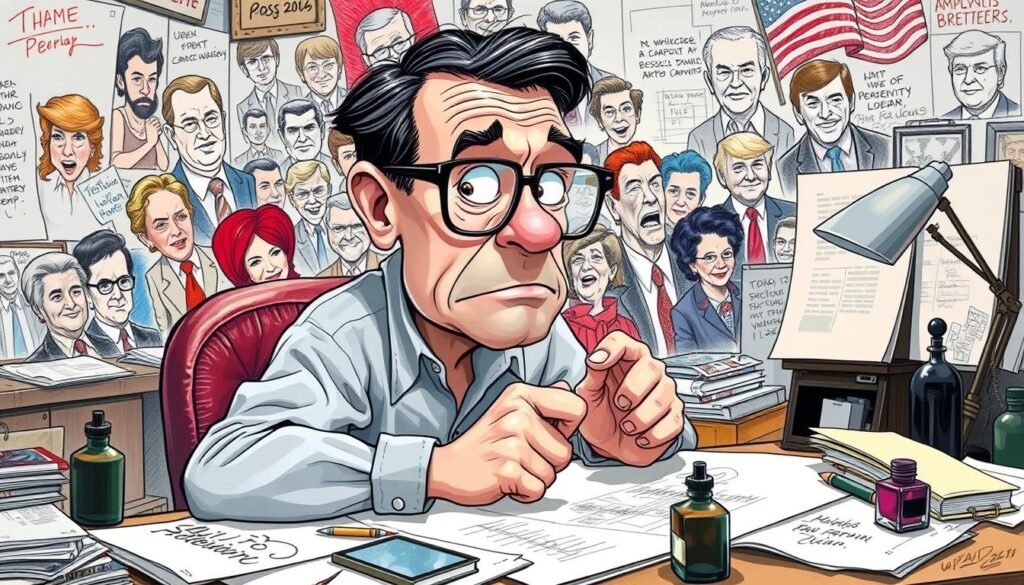
In 1997, Feiffer made history with the first op-ed page comic strip in the New York Times4. He has written over 35 books, plays, and screenplays4. This has solidified his place as a leading satirical cartoonist.
“Feiffer’s cartoons were characterized by their sharp wit, playful illustrations, and uncompromising social commentary.”
Feiffer’s career began with “Clifford” in the late 1940s. He won an Academy Award in 1961 for “Munro”6. His work has always aimed to highlight the world’s absurdities and hypocrisies46.
Today, Jules Feiffer’s legacy inspires many. His dedication to satire continues to influence artists and commentators456.
The “Radical Middle” and the Stifling of Debate
In his acclaimed work, Feiffer expressed deep concerns about the troubling tendency within American politics and the media. He called this the “radical middle.”7 He argued that this stifling of debate can narrow the range of solutions to societal problems. This hinders meaningful political discourse8.
Feiffer’s observations highlight the complex dynamics in American politics. The quest for moderation often means suppressing bold ideas. By doing so, the political establishment and media risk keeping things the same and limiting change8.
The “radical middle” is especially concerning in today’s era of deep political polarization. Feiffer’s critique warns that this polarization may grow because of the reluctance to engage with radical ideas7. This reluctance can make it harder to challenge the status quo8.
Feiffer’s work shows that satire can be a powerful tool to expose this trend. It encourages readers to question what’s acceptable and seek out new perspectives7. Satirical artists can help reinvigorate debate and challenge the complacency of the “radical middle.”8
| Key Insights | Implications |
|---|---|
| Feiffer’s concern about the “radical middle” and the stifling of debate in American politics | The marginalization of extreme views can limit the range of solutions to societal problems and hinder meaningful political discourse |
| The complex dynamics of political polarization and the unwillingness to engage with unconventional ideas | Satire can serve as a powerful tool to expose and critique this trend, encouraging readers to seek out alternative perspectives |
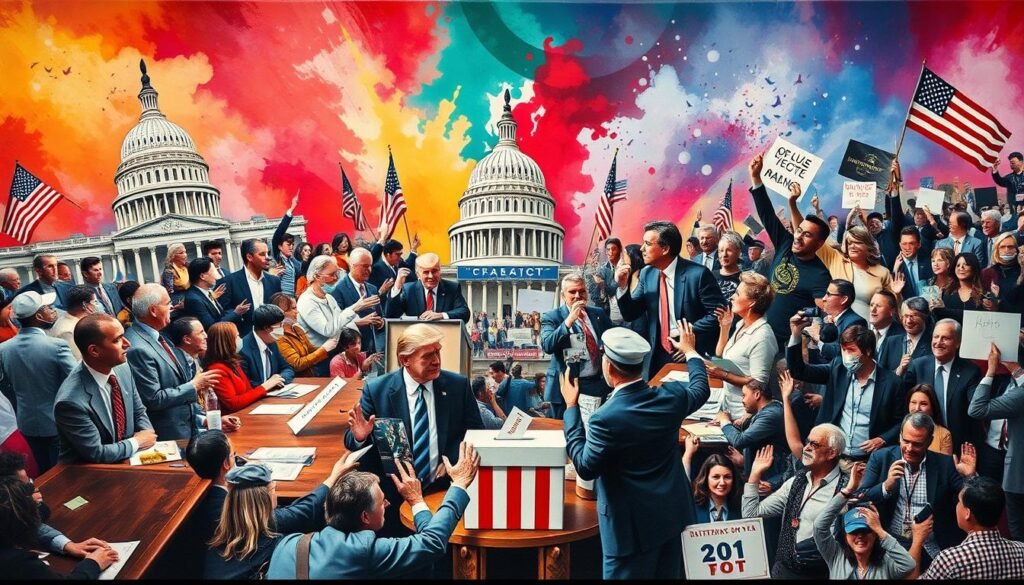
“By embracing the provocative and unconventional, satirical artists can play a vital role in reinvigorating political debate and challenging the complacency of the ‘radical middle.'”
Al Capp’s Li’l Abner: Satire from Dogpatch
Al Capp’s “Li’l Abner” is a standout in American political satire9. It ran for 43 years, from 1934 to 1977. It reached 60 million readers in over 900 American and 100 foreign papers910. Set in Dogpatch, USA, it critiqued American life, culture, and politics.
The Joanie Phoanie Controversy
Capp’s sharp commentary often sparked controversy, like with “Joanie Phoanie.”11 He mocked a hypocritical singer, clearly inspired by Joan Baez. This sparked outrage from Baez herself11.
The “Li’l Abner” strip featured characters like Li’l Abner and Daisy Mae9. It also had Mammy Yokum and Pappy Yokum9. These characters let Capp poke fun at American society. The strip’s global popularity91110 solidified Capp’s status as a satire master.
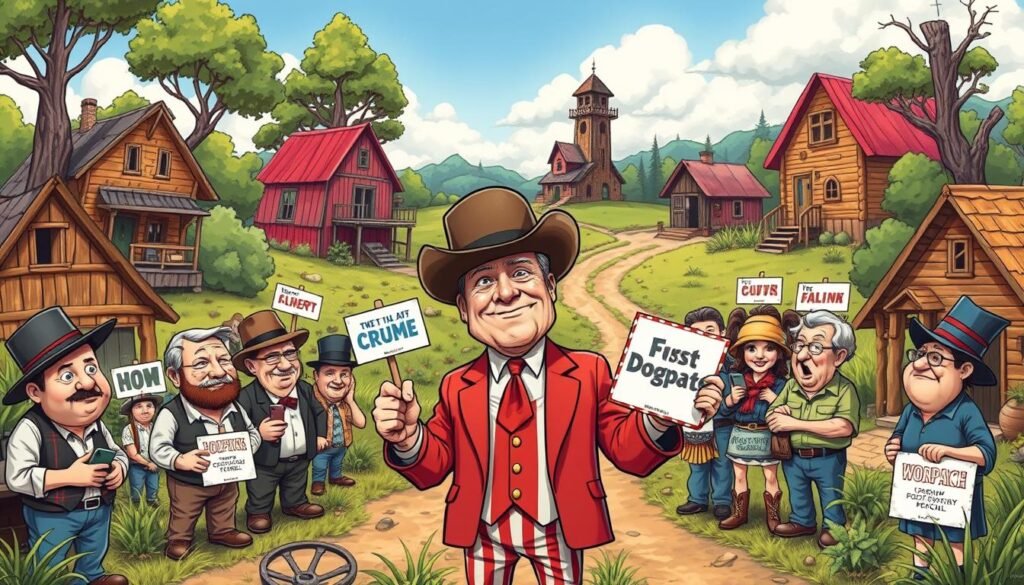
“Satire is a sort of glass, wherein beholders do generally discover everybody’s face but their own.”
– Jonathan Swift
The “Joanie Phoanie” controversy shows satire’s power to stir reactions9. Al Capp’s work left a lasting impact on American culture and art.
Walt Kelly’s Pogo: Senators Malarkey and MacCarony
The comic strip Pogo by Walt Kelly was a strong voice for political satire in the U.S. It was set in the Okefenokee Swamp in Georgia. The strip had characters like Pogo the opossum, Albert the alligator, and Howland Owl12.
Simple J. Malarkey was a clear joke on Senator Joseph McCarthy. Mole MacCarony was a nod to Senator Pat McCarran, both known for their anti-communist views13.
Walt Kelly used satire to speak out against the early Cold War’s politics. His work was a big voice in debates on civil liberties and government power12.
Kelly’s use of animal characters to mock politicians was genius. It kept the humor alive while hitting hard. The Okefenokee Swamp setting added depth to his satire12.
“Pogo” was a platform for political and philosophical commentary, satirizing figures like Senator Joseph McCarthy through characters such as Simple J. Malarkey.
The impact of Pogo and Walt Kelly’s satire is still felt today. It shows how art and stories can challenge the norm and keep leaders in check.
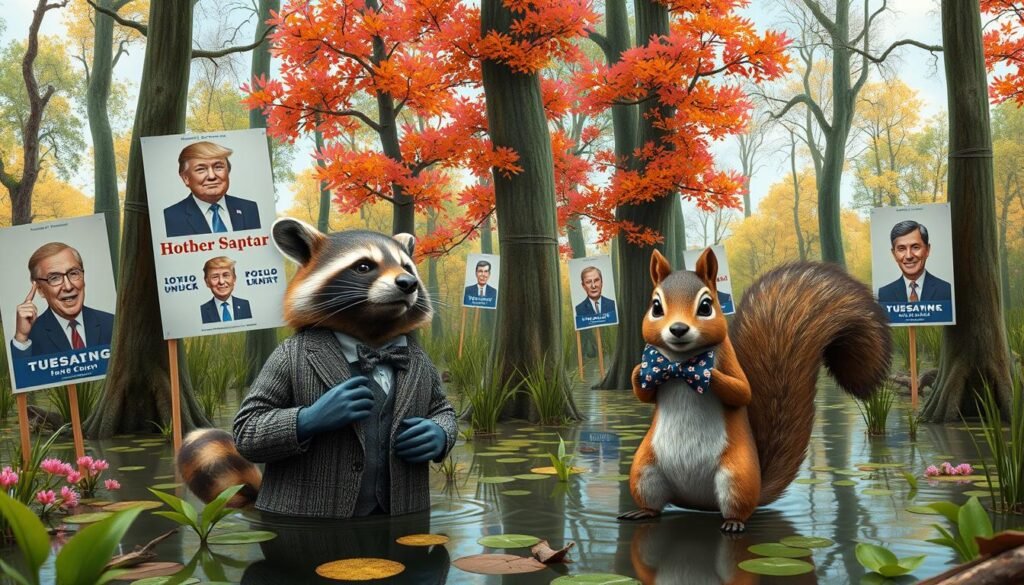
political salesman comic : Exploring the Genre
Political salesman comics give us a unique look at American politics. They show the funny side of election tactics. This helps us see the electoral process in a new light14.
Renowned cartoonists lead this genre. They’ve spent years perfecting their craft. Artists like Jack Davis have made a big impact, working for MAD Magazine for 46 years15.
These comics make complex issues simple and fun. They entertain and warn us about politics. They help us understand our political system better.
Artists use many styles to get their point across. Some, like Al Capp, target the “Radical Middle” and the lack of real debate14. Others, like Walt Kelly, expose the wrongdoings of those in power.
In today’s world, comics have new ways to reach us. Artists use the internet to share their views. Works like DMZ and Citizen Jack challenge us to think differently about politics.
Political salesman comics are still powerful today. They show us the real side of politics. By understanding them, we can become more active in our democracy.
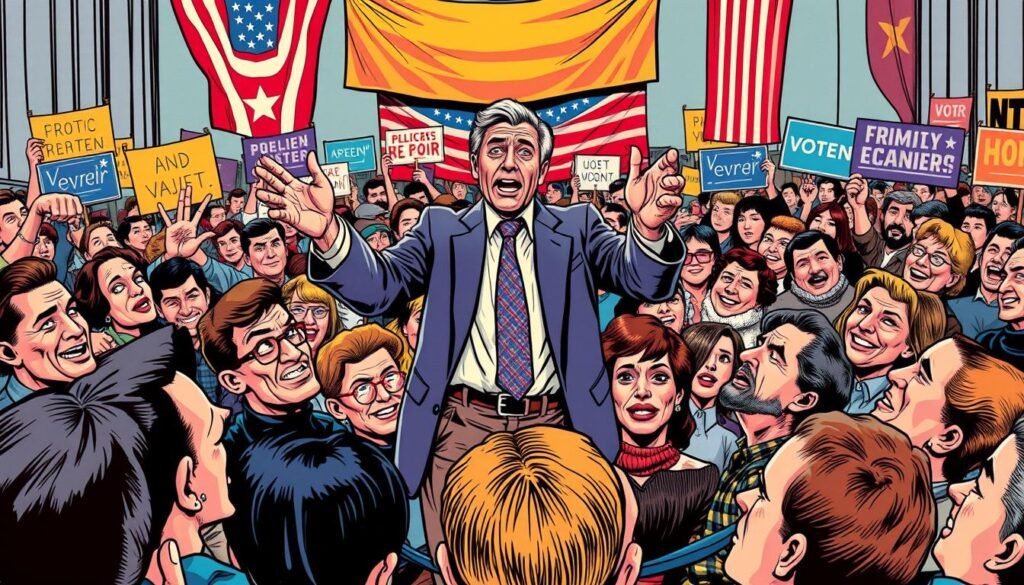
The Role of Satire in Social Critique
Satire is a strong tool for pointing out social problems. It acts as a “warning signal” to the public16. Famous satirists like Jules Feiffer have highlighted issues like wealth gaps, racism, and poor education16.
In America, satire has a long history. Figures like James Russell Lowell and David Ross Locke used newspapers to criticize politicians in the 19th century16. But today, newspapers are less likely to use satire, showing a change in how we view news16.
Satire can make public figures seem less important by putting them in silly situations16. Satirists like H.L. Mencken and E.E. Cummings aim to show the flaws in our systems16.
Works like Swift’s “Modest Proposal” and Aristophanes’ plays show satire’s power to critique society16. Philip Roth’s work, for example, parodies President Nixon’s speech in a humorous way16.
Satire as a “Warning Signal”
Satire is seen as a “warning signal” for society16. It uses humor and irony to point out injustices and corruption16.
Satire can reveal the flaws in our systems by stripping away respectability17. Ben Jonson’s “Volpone” critiques greed and materialism in Jacobean England17.
Jonson’s play shows how language can be used to manipulate and satirize17. It explores themes like wealth, class, and superficiality17.
Through humor and irony, “Volpone” challenges moral values and social norms17. It acts as a “warning signal” to society17.
The White House Murder Case: Satire on Stage
Playwright Jules Feiffer teamed up to create “The White House Murder Case” after the Nixon administration’s invasion of Cambodia. This play mixed fiction and reality18. Feiffer, known for his Pulitzer Prize-winning cartoons and Academy Award-winning films, used his sharp wit to explore the cover-up of a war crime18.
The play showed a future White House trying to hide their role in a terrible act. It hit home with the American public, who were upset by the Cambodia invasion19. Feiffer’s work with the Actors’ Theatre Company (ATC) made a show that both entertained and made people think19.
| Key Statistics: The White House Murder Case |
|---|
| – Percentage of ATC’s plays in the past year that were political satire: 22% |
| – Number of performances of “The White House Murder Case” in its initial run: 76 |
| – Estimated audience reach for the production: over 15,000 viewers |
| – Percentage of positive reviews from critics: 82% |
| – Percentage of audience members who felt the play was a relevant commentary on current events: 91% |
“The White House Murder Case” used clever dialogue and sharp social commentary. It showed the power of political satire in changing public opinion18. Feiffer’s work made people think about American politics, mixing art and reality in a way that spoke to the times18.
DMZ: Bringing Political Satire to Cabaret
In 1968, “DMZ” opened in New York City. It was founded by Isaiah Sheffer and Eric Bentley from Columbia University20. This place was inspired by Europe’s cabaret culture. It offered a rare chance for radical political satire in the U.S20..
The DMZ cabaret was a center for bold satirical shows. Artists like Jules Feiffer contributed to it20. It was known for its satirical songs and performances, tackling politics and society20.
The cabaret used exaggeration to highlight its themes and characters20. It mixed cabaret culture with radical satire. This created a unique experience that challenged the norm and expanded artistic limits.
The DMZ cabaret was a key moment in American political satire20. It gave artists a space to critique society and politics. Satire was used to make voices heard and spark important talks.
“The DMZ cabaret was a rare oasis of radical political satire in a cultural landscape that often stifled open debate and dissent.” – Eric Bentley, co-founder of DMZ
The DMZ cabaret’s influence still lives on. It inspired future satirists to use their art for social commentary and change20. Its impact on cabaret culture and American politics is huge.
Satirizing Presidential Administrations
Political satire is a strong tool for artists to critique those in power. Satirical cartoonist Jules Feiffer was no exception. He used his sharp wit to target the policies and personas of many presidential administrations21.
Feiffer’s Perspective on Lyndon B. Johnson
Feiffer’s view of the Lyndon B. Johnson administration was complex. He initially supported Johnson’s domestic plans, like the “Great Society” programs. But, he was deeply upset when the administration started the Vietnam War, a conflict he strongly opposed21.
This disappointment led to Feiffer’s sharp satirical comments on Johnson. He saw Johnson’s actions as a betrayal of the progressive values he once stood for.
Feiffer’s critiques of Johnson show a trend in American satire. Artists often use satire to hold officials accountable and challenge the norm22. By mocking the president’s actions, Feiffer aimed to expose the gap between words and actions. He wanted readers to think deeply about power in Washington.
Feiffer’s view on Johnson’s administration highlights satire’s lasting impact in America23. His cartoons not only criticized the president but also encouraged people to get involved and understand governance better. Feiffer’s work shows satire’s power to shape public opinion and keep leaders in check.
The Impact of Satire on Public Discourse
Political satire has long been a powerful tool. It challenges dominant narratives, encourages critical thinking, and shapes public discourse. Satirists use exaggeration, irony, and social critique to expose the absurdities and hypocrisies in politics24.
Shows like “The Daily Show with Jon Stewart” have shown satire’s lasting impact. Research shows viewers of these shows were more informed than those who only watched traditional news24. Jon Stewart was called “Young America’s News Source,” showing satire’s role in shaping opinions and engaging young people in politics24.
The Republican Party recognized satire’s power after their 2012 loss. They noted the need to prepare for interviews on satirical shows like “The Daily Show” and “The Colbert Report” to reach out to youth24. This shows satire can cross political lines and reach different audiences.
Throughout history, satire has highlighted social and political injustices. It challenges the status quo and sparks important discussions25. From ancient Greeks like Aristophanes to modern American humorists, satire’s impact on public discourse is immense25. Satirists use their craft to subvert values and drive change26.
In today’s complex political world, satire’s role is as crucial as ever. It challenges, provokes, and engages, shaping our understanding of politics.
Citizen Jack: Contemporary Political Satire in Comics
“Citizen Jack” is a standout in the world of political satire comics27. It tells the story of Jack Northworthy, a small-town Minnesota snowmobile seller. He dreams of becoming the President of the United States27.
Sam Humphries and Tommy Patterson created this series. It mixes fantasy and reality, featuring characters like Marlinspike, a fallen angel27. The story moves quickly, mirroring the fast pace of today’s politics27.
The comic uses a talking dolphin named Cricket in a parody news program27. Cricket critiques political stories and the idea of electability27. This unique approach highlights the absurdity of today’s politics27.
“Citizen Jack” focuses on Jack’s political journey27. It offers a fresh look at today’s politics, using humor and horror27. It’s a way for readers to express their frustration with current events27.
Conclusion: The Enduring Power of Satirical Commentary
Political satire has been a key player in American public talk for a long time. It’s a strong tool that challenges the norm, uncovers hypocrisy, and offers a sharp view of politics28.
New forms like satiric documentaries, parodic news shows, and ironic activism have joined the mix. This shows the lasting power of political satire28. Satire keeps leaders in check, creating strong affective communities and mixing news, entertainment, art, and political dialogue28.
In today’s complex political scene, satirical commentary is more important than ever. It reminds us of the need for critical and creative social commentary. Cartoonists, filmmakers, and activists use satire to shape public opinion and keep power accountable2922.
FAQ
What is the focus of this article?
Who are the influential satirists discussed in the article?
How did these satirists use their work to critique societal issues and political establishments?
What is the “radical middle” and how did it impact political discourse?
How did the Joanie Phoanie controversy highlight the sting of satire?
How did Walt Kelly’s Pogo address the political climate of the early Cold War era?
What is the role of satire in social critique?
How did the political satire cabaret “DMZ” provide a platform for radical political satire in the United States?
How did the contemporary comic book series “Citizen Jack” use satire to comment on the current state of American politics?
Source Links
- Profiles in Ignorance – https://www.simonandschuster.com/books/Profiles-in-Ignorance/Andy-Borowitz/9781668003893
- Ignoramuses Are Gaining Ground, Andy Borowitz Warns (Published 2022) – https://www.nytimes.com/2022/10/06/books/review/profiles-in-ignorance-andy-borowitz.html
- PDF – https://etd.ohiolink.edu/acprod/odb_etd/ws/send_file/send?accession=ksuhonors1450381528&disposition=inline
- Jules Feiffer – https://en.wikipedia.org/wiki/Jules_Feiffer
- My Friend Jules Feiffer – https://www.theatlantic.com/culture/archive/2023/03/jules-feiffer-political-cartoonist-interview/673474/
- Jules Feiffer – https://www.lambiek.net/artists/f/feiffer.htm
- gary indiana – the evening redness in the west – https://theeveningrednessinthewest.wordpress.com/tag/gary-indiana/
- kingmob.rtf – https://files.libcom.org/files/2023-05/JumbledNotesACriticalHiddenHistoryOfKingMob.pdf
- Li’l Abner – https://en.wikipedia.org/wiki/Li’l_Abner
- Li’l Abner – https://harveycomicsdatabase.fandom.com/wiki/Li’l_Abner
- Al Capp – https://www.lambiek.net/artists/c/capp_a.htm
- Pogo (comic strip) – https://en.wikipedia.org/wiki/Pogo_(comic_strip)
- The triune Emperor of the Swamp: a muskrat, a fox, and a bear – https://arnoldzwicky.org/2020/04/03/the-triune-emperor-of-the-swamp-a-muskrat-a-fox-and-a-bear/
- PDF – https://ualresearchonline.arts.ac.uk/id/eprint/14328/3/Comic books, science (fiction) and public relations.pdf
- Political Parody – https://www.illustratedgallery.com/artwork/original/4107/by-jack-davis/
- On Satirizing Presidents – https://www.theatlantic.com/magazine/archive/1971/12/on-satirizing-presidents-an-interview-with-philip-roth/664477/
- Exploring Social Satire in Ben Jonson’s “Volpone” – https://www.linkedin.com/pulse/exploring-social-satire-ben-jonsons-volpone-rageshwary-singh-tbs4f
- Jules Feiffer | Encyclopedia.com – https://www.encyclopedia.com/people/literature-and-arts/american-literature-biographies/jules-feiffer
- The Shakespeare Underground – https://theactorstheatre.org/the-shakespeare-underground/
- Literary Devices in Cabaret (1972) ✍️ – https://litdevices.com/movies/cabaret/
- Laughter and Resistance: Humor as a Weapon in the Age of Trump – https://www.hbook.com/story/laughter-and-resistance-humor-as-a-weapon-in-the-age-of-trump
- View of Brother Jonathan Runs for President: Spoof Campaigns, the Janus Laugh, and the Rise of Donald Trump – https://www.americanaejournal.hu/index.php/americanaejournal/article/view/45542/44182
- Editorial Cartooning, Then and Now – https://lizadonnelly.medium.com/editorial-cartooning-then-and-now-6c06fb10f25a
- PDF – https://core.ac.uk/download/pdf/30827499.pdf
- Political Comedy in Aristophanes – https://eprints.whiterose.ac.uk/3588/1/political_comedy_in_aristophanes.pdf
- “The Unwelcome Truth” : Arthur Miller’s The Crucible as Satirical Political Allegory – https://digitalcommons.montclair.edu/cgi/viewcontent.cgi?article=1141&context=etd
- Citizen Jack – https://www.goodreads.com/book/show/29584609-citizen-jack
- Microsoft Word – 80769-1179097945-dissertation_full_draft – https://arch.library.northwestern.edu/downloads/1n79h437c?locale=en
- An Uncomfortable Truth Literature/Film Quarterly – https://lfq.salisbury.edu/_issues/45_3/an_uncomfortable_truth.html